| Author |
Topic: Conversion of guitar tablatures for PSG |
Matthieu Leschemelle
From:
Saint Germain en Laye, France
|
 Posted 18 Aug 2022 3:19 am
Posted 18 Aug 2022 3:19 am |
|
Hi,
I would like to ask for your expert advice on a development project that seems promising.
It is to facilitate the conversion of guitar tablatures for PSG with TablEdit.
In this sample file https://tabledit.com/tabs/CRYME.tef, the 3rd module represents the original guitar tablature.
The first module ("Before Optimisation") shows the tablature that results from the simple conversion to PSG E9 tuning (Instrument->Tuning) with of course the option "Incidence -> Fingerings" to keep the pitch of the notes. All the notes are there but the tablature is quite inconsistent. Pedals and levers are not used.
The second module ("After Optimisation") presents the tablature of the first module after Transposition without pitch change but with the "Optimize fingerings" option.
This option has the effect of eliminating the tied notes (which pose complex problems) and above all of adding a constraint (all notes on a beat must be on the same fret) and a facility (levers and pedals) in case of chord. In case of a single note, positions without effect are favored.
The result seems interesting to me (I don't play PSG) but there are certainly problems that I could perhaps solve.
Thank you.
Matthieu
NB: the original tab has been tabledited by Duane Langston http://duanelangston.myartsonline.com |
|
|
 |
Matthieu Leschemelle
From:
Saint Germain en Laye, France
|
 Posted 24 Aug 2022 5:13 am Conversion of guitar tablatures for PSG
Posted 24 Aug 2022 5:13 am Conversion of guitar tablatures for PSG |
|
A little disappointed that I didn't get any response to my post but it takes more than that to discourage me 
I continued to work on the transposition. Here is the result in pictures. The bottom tablature is the original guitar tablature. The top one is the raw conversion. Of course, you can improve it.
In this respect, the new [shift]+[J] key is very powerful. It allows to display successively all the possible positions for the chord.
Please note that this result is only possible with the latest version v3.02 b3a (Mac or Windows).
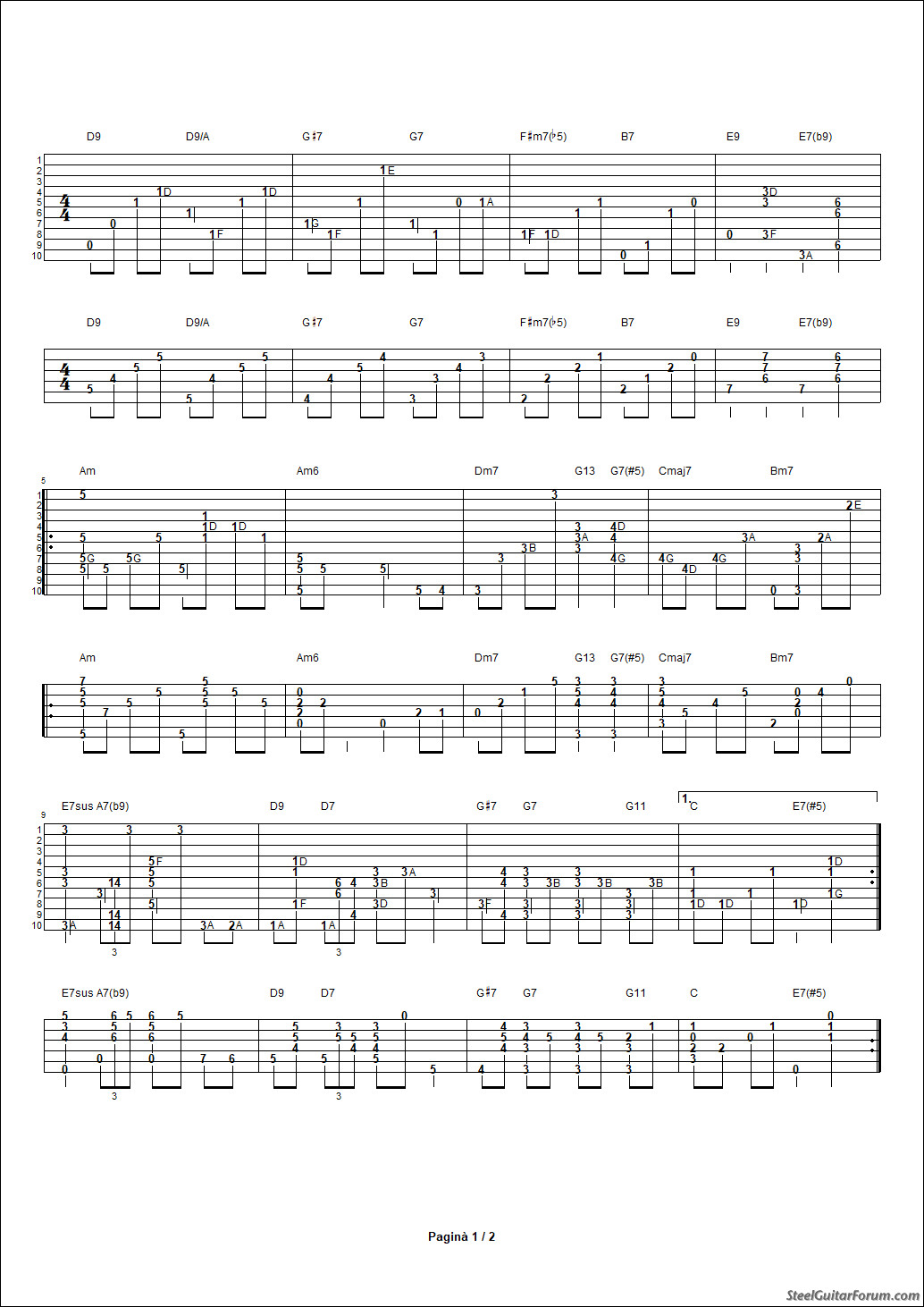 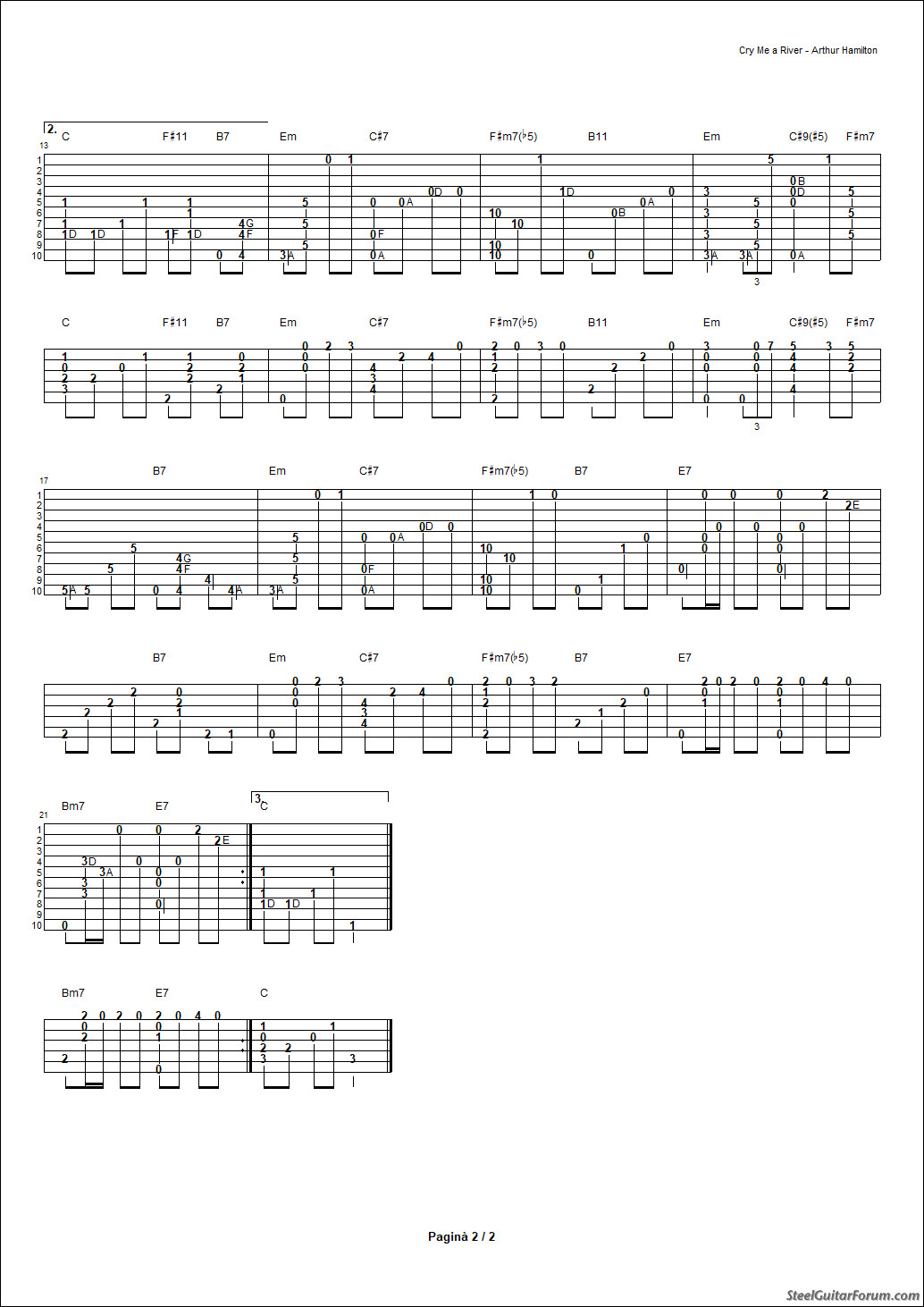 |
|
|
 |
Mike Neer
From:
NJ
|
 Posted 24 Aug 2022 8:33 am
Posted 24 Aug 2022 8:33 am |
|
Matthew, I’ve always really enjoyed using TablEdit and your responsiveness. I don’t play PSG either, but let’s see if I can round up some scrutinizers. I wouldn’t be disappointed, I just believe this is a less seldom visited section of the forum.
_________________
Links to streaming music, websites, YouTube: Links |
|
|
 |
Tucker Jackson
From:
Portland, Oregon, USA
|
 Posted 24 Aug 2022 8:56 am
Posted 24 Aug 2022 8:56 am |
|
Hi, Matthieu.
Thanks for your efforts here.
It's good that you asked for advice here because this project has one more layer that needs to be added, and it's a bit complicated.
The "problem" with transposing parts for PSG is that, since we have pedals and knee levers, almost every note is available at every fret. This is the only instrument I know of that is this complicated, so it introduces a new problem: what is the best fret to play the part?
Having almost every note available at every fret may seem like a good thing, but a new player to PSG will often struggle to find the easy, common fret position to play something. Instead, they might be one fret off from the common position. Or they may be playing awkward string grips or making difficult bar moves. All the notes are correct -- but since they are a new player, they don't know that there is a far easier way to play the part if they just use different strings, different pedals/knees, or a different fret.
For example, looking at the first measure of the tablature, the notes are correct. However, it's difficult to play. There are some common string-grips and knee lever positions for playing out of a D chord position that would lay easier on the neck and allow players to rely on the positions they normally use all the time (and not have to move the bar for that chord).
My first choice would be fret 3, using the E-lower lever (your tab calls it "D") and the B-pedal.
Second choice would be fret 1, using the A-pedal and the F lever.
As the person developing this software, you may need to learn a little bit about some common ways to play at least the major, minor and seventh chords. Specifically, there are several typical fret positions in combination with and pedals/knees and certain strings.
With that knowledge, you may be able to build a hierarchy within the software to prioritize those typical fret positions. Each new chord in the song will need the software to consider where some of the common positions are... and then try to place the notes in that context. Let me know if you need more specific information and I can send you an email or private message.
Last edited by Tucker Jackson on 24 Aug 2022 9:07 am; edited 1 time in total |
|
|
 |
Mike Neer
From:
NJ
|
 Posted 24 Aug 2022 9:05 am
Posted 24 Aug 2022 9:05 am |
|
And Tucker, I would add to your point that not only is it about finding the right position for ease of playing, but which has the right timbre for the part. That is subjective, but I think gets to the heart of what many serious players are also thinking.
_________________
Links to streaming music, websites, YouTube: Links |
|
|
 |
Marty Broussard
From:
Broussard, Louisiana, USA
|
 Posted 24 Aug 2022 9:31 am
Posted 24 Aug 2022 9:31 am |
|
What Tucker and Mike said. I’m watching for others comments/input…..
_________________
RETIRED
"Technique is really the elimination of the unnecessary..it is a constant effort to avoid any personal impediment or obstacle to achieve the smooth flow of energy and intent" Yehudi Menuhin |
|
|
 |
Matthieu Leschemelle
From:
Saint Germain en Laye, France
|
 Posted 24 Aug 2022 10:58 am Conversion of guitar tablatures for PSG
Posted 24 Aug 2022 10:58 am Conversion of guitar tablatures for PSG |
|
Thank you for these very sensible comments.
I don't think a program will ever be able to make the aesthetic choices of a human being. Even for the guitar, which I know better, I gave up a long time ago 
On the other hand, the program can give the tools to easily do a tedious job.
For example, your idea of playing the 1st bar on the 3rd position can be done with TablEdit by re-entering all the notes one after the other. You can also use the J key which will eventually give you a position in 3. Finally, you can use the Transpose function without changing the pitch, but limiting it to the first bar and requiring position 3:
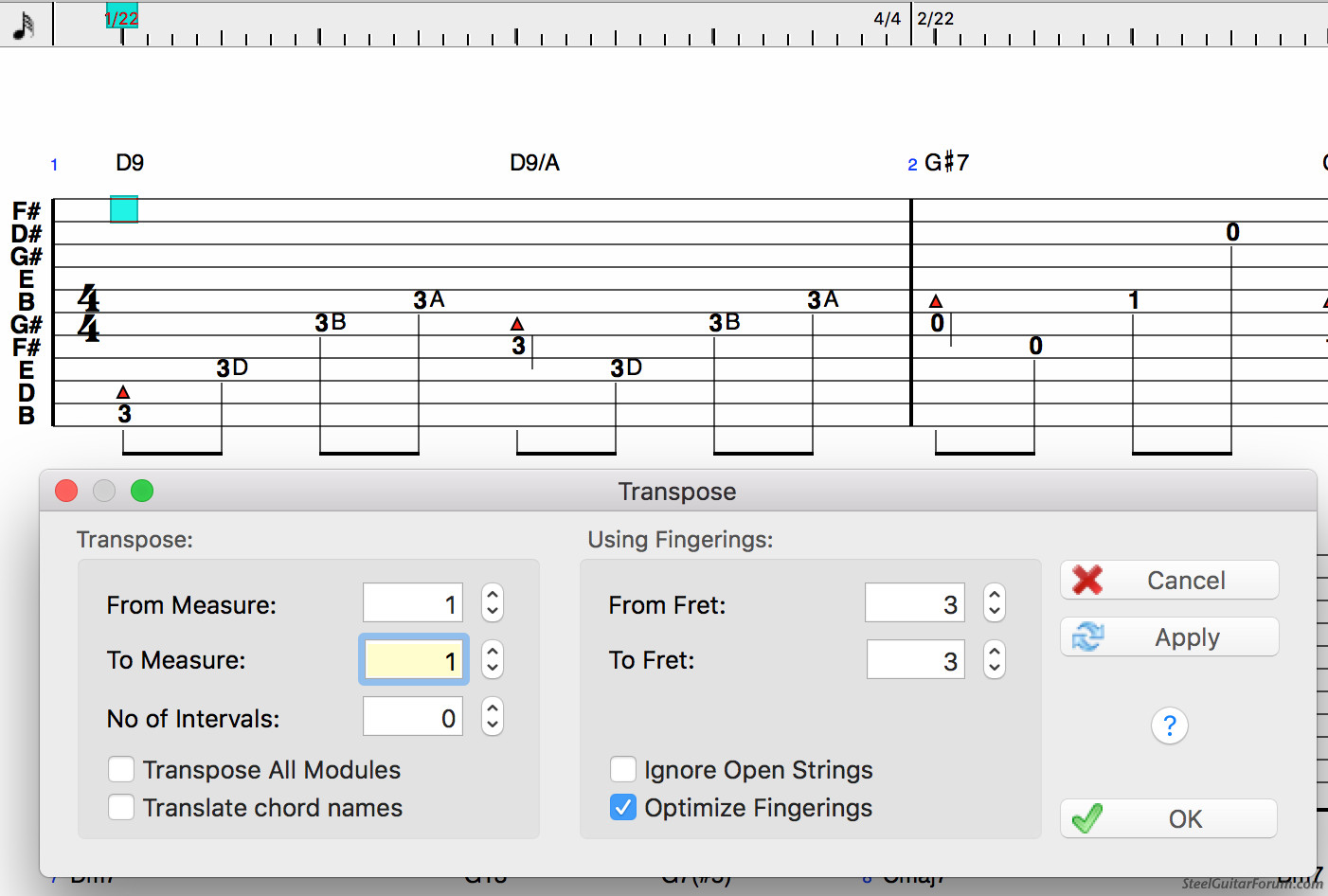
There must be registered users on this forum. I would like them to try the version 3.02 b3a. I don't think they will be disappointed.
Of course, if there are any rules, even complicated ones, that can be modeled, I am curious. By default TE favors the positions without pitch change but I understand it may be a bit too simple.
Matthieu |
|
|
 |
Tucker Jackson
From:
Portland, Oregon, USA
|
 Posted 24 Aug 2022 11:57 am Re: Conversion of guitar tablatures for PSG
Posted 24 Aug 2022 11:57 am Re: Conversion of guitar tablatures for PSG |
|
| Matthieu Leschemelle wrote: |
. You can also use the J key which will eventually give you a position in 3. Finally, you can use the Transpose function without changing the pitch, but limiting it to the first bar and requiring position 3.
|
Nice. It's good that the user has the ability to change the tab. An experienced player could make adjustments.
It's a little bit of a conundrum. People who really need tab to play are often newer players and they are the same ones that don't necessarily understand that, say, Fret 3 is a great place to play that first measure. And almost every measure needs attention to make it lay logically on the neck...
So, those kinds of newer players really need to the program to make a few decisions for them if it's going to REALLY work well for PSG. As I said, it's a complicated instrument. But I could suggest a set of positions that the program could use when laying out a part in the context of a given type of chord -- I think if the software could then prioritize some of those positions, where possible, it would get the tab much closer to being how a PSG player would do it if they transposed the song by ear, putting the bar in it's more natural place.
Also, I think this software would be even better for non-pedal steel -- provided it could model the ability to do a bar slant for those times it's required. I think you would have an easier time creating great tab if the software was designed around an instrument that does NOT have too many choices for how to get one set of notes. I also think there would be a larger market for non-pedal steel, but that's just my opinion. |
|
|
 |
Matthieu Leschemelle
From:
Saint Germain en Laye, France
|
 Posted 24 Aug 2022 1:09 pm
Posted 24 Aug 2022 1:09 pm |
|
Hi Tucker,
In fact, TablEdit has been around for a quarter of a century. It supports all plucked string instruments and in particular the banjo. But not only: it also supports the diatonic or chromatic accordion, the drums, the Anglo-Irish concertina, the harmonica, the diatonic and hammered dulcimers, the Vosges spinet, the oud, the lute, the recorder, the flageolet, the siyotanka, the autoharp, the xaphoon etc... 
The principle I follow is that as soon as an instrument can be tablatured, TablEdit must manage it with its singularities.
That's how I added the pedal steel guitar about twenty years ago at the request and advice of Doug Beaumier. Then more recently I added the management of fully configurable copedents.
This extreme versatility has only advantages. I believe that the banjo, guitar or accordion player who uses the software thinks that it was designed just for his instrument  I also know that we haven't quite reached that point of integration for PSG. I also know that we haven't quite reached that point of integration for PSG.
Matthieu
PS: There is no problem for tabbing a bar slant with TablEdit. |
|
|
 |
Michael Hill
From:
Arizona, USA
|
 Posted 24 Aug 2022 3:27 pm
Posted 24 Aug 2022 3:27 pm |
|
Converting 6 string guitar tab to pedal steel tab doesn't sound useful to me. i.e. I've never had a need or desire to play the same part on both of those instruments. YMMV!
Peaceful Easy Feeling solo might be the one exception. |
|
|
 |
Jim Fiegen
From:
California, USA
|
 Posted 24 Aug 2022 5:51 pm
Posted 24 Aug 2022 5:51 pm |
|
I am currently writing a book entitled "Contemporary Sounds for the Pedal Steel" I have searched for a program that would allow me to write examples with regular notation above and Tablature below, using a reasonably normal copedant for E9 tuning, similar to the notation in a Mel Bay guitar instruction book. I tried to get Tabledit to work, as well as several other programs like MuseScore. I've had very little success and am now experimenting with a combination of my own tab templates and MuseScore. I'm still not there and am amazed at how primitive all of these systems are... https://jimfiegen.com/steel-guitar-blog/
_________________
http://jimfiegen.com |
|
|
 |
Matthieu Leschemelle
From:
Saint Germain en Laye, France
|
 Posted 25 Aug 2022 2:56 am
Posted 25 Aug 2022 2:56 am |
|
@Michael Hill
It is an opinion, respectable as is the desire of those who asked me to facilitate the operation.
There are also people who never use tablature or who make it with a spreadsheet. I respect them, but this is no reason for me to stop developing TablEdit 
Matthieu |
|
|
 |
Matthieu Leschemelle
From:
Saint Germain en Laye, France
|
 Posted 25 Aug 2022 3:25 am
Posted 25 Aug 2022 3:25 am |
|
@Jim
You have to consider the hypothesis that it is not the program that is insufficient but that the learning of the program has a steep learning curve.
For example, in a few minutes I can enter in TablEdit the example of your blog. (https://jimfiegen.com/the-e-f-lever-change-and-the-blues/)
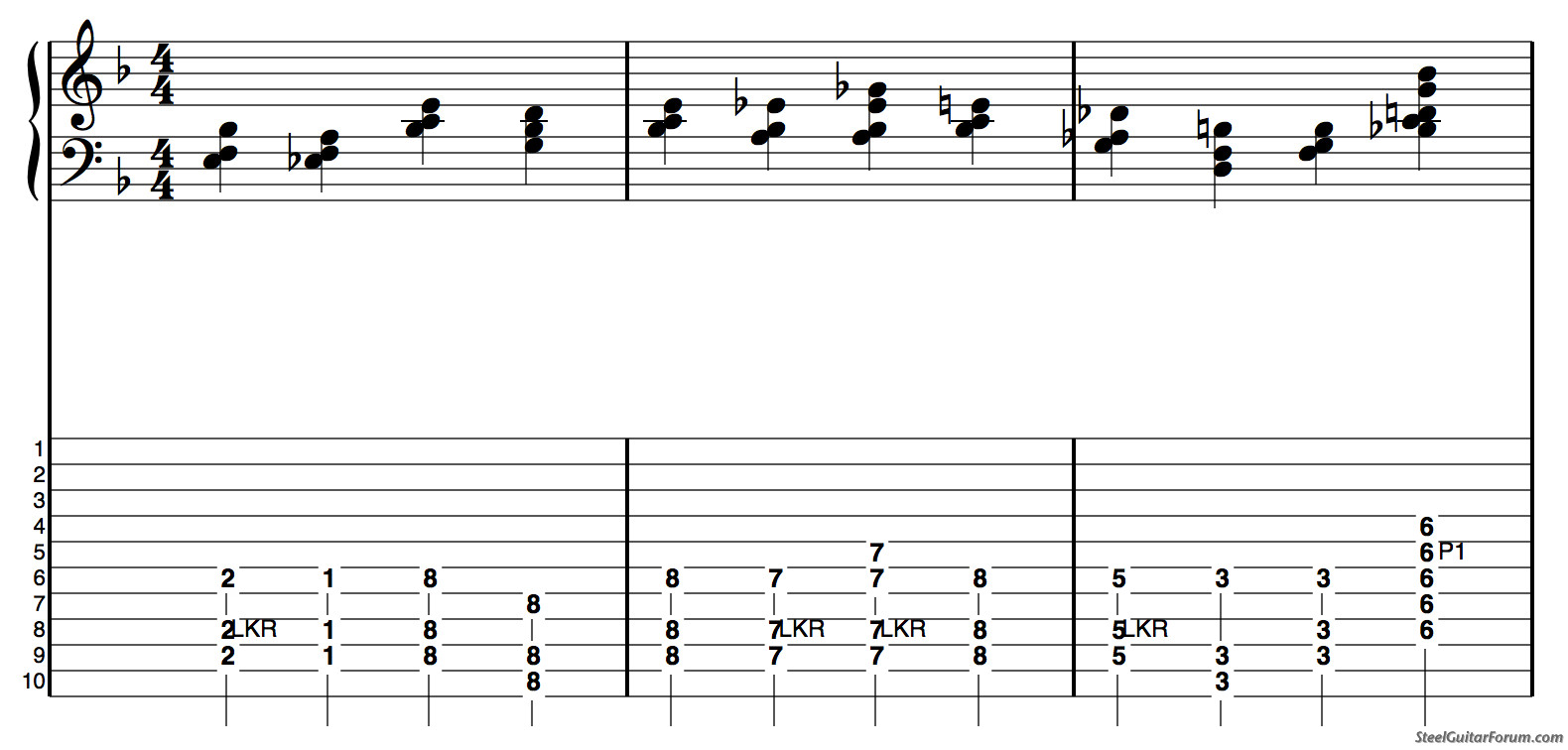
I would certainly not be able to do it with Musescore because I don't master the program enough. By the way, I think that Musescore is unable to display the tablature of the song as well as TablEdit does natively.
Matthieu
| Jim Fiegen wrote: |
| I am currently writing a book entitled "Contemporary Sounds for the Pedal Steel" I have searched for a program that would allow me to write examples with regular notation above and Tablature below, using a reasonably normal copedant for E9 tuning, similar to the notation in a Mel Bay guitar instruction book. I tried to get Tabledit to work, as well as several other programs like MuseScore. I've had very little success and am now experimenting with a combination of my own tab templates and MuseScore. I'm still not there and am amazed at how primitive all of these systems are... https://jimfiegen.com/steel-guitar-blog/ |
|
|
|
 |
Jim Fiegen
From:
California, USA
|
 Posted 25 Aug 2022 6:35 am learning of the program has a steep learning curve.
Posted 25 Aug 2022 6:35 am learning of the program has a steep learning curve. |
|
learning of the program has a steep learning curve.
I agree, I spent quite a bit of time with the 3.0 manual trying to duplicate what you just did. I guess it helps that you wrote the program,
Any tips on how to duplicate this? I'm still registered user so I downloaded the latest up date.
_________________
http://jimfiegen.com |
|
|
 |
Matthieu Leschemelle
From:
Saint Germain en Laye, France
|
 Posted 25 Aug 2022 8:13 am Re: learning of the program has a steep learning curve.
Posted 25 Aug 2022 8:13 am Re: learning of the program has a steep learning curve. |
|
I have selected the E9 tuning. It created a 10 line tablature.
I then entered the notes beat by beat by typing the position number. There is a very useful trick in TE that works very well with the PSG: you pre-select strings 6 to 9 and type 2. All 4 strings are now with a 2. You just have to remove the 2 from the string 7 and put the effect on the string 8.
I finally applied the effects by typing A or F on the note. I could also have used the Pitch Change dialog box. The important thing is to apply the pitch change on an existing note.
Here is a new version with the chord names. I also edited the copedent so that the effect is displayed as A or F. Finally I modified the clef and middle C (just for a change) There are a few other cosmetic changes too.
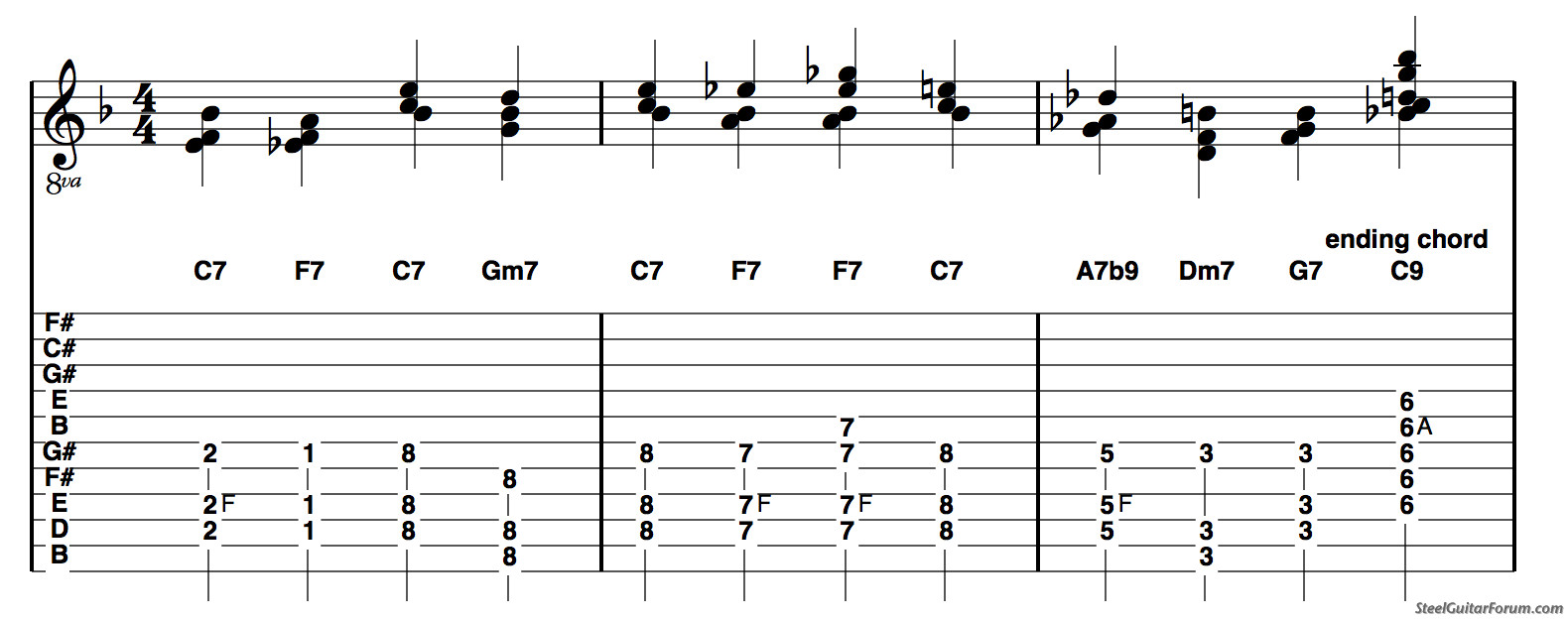
But I realize that there is a little problem with the PSG: I thought that the notes and the chord names are a bit too high and that the line should not be erased at the note level. But with a PSG you can't correct that. I will correct this.
I'm sending you the tef file in a private email.
Matthieu
| Jim Fiegen wrote: |
learning of the program has a steep learning curve.
I agree, I spent quite a bit of time with the 3.0 manual trying to duplicate what you just did. I guess it helps that you wrote the program,
Any tips on how to duplicate this? I'm still registered user so I downloaded the latest up date. |
|
|
|
 |
Fred Treece
From:
California, USA
|
 Posted 25 Aug 2022 8:15 am
Posted 25 Aug 2022 8:15 am |
|
It might take an hour or two to set up the program for your copedent and write out a basic blues line like that. There is a whole lot more to it that takes a little more time as you go along, like when you need to figure out how to tab a 3-note chord with a pick-bend-slide up 2 frets-release bend-bend again, all held for a full measure. How long does the slide last? How long is the release held before the next bend? These types of nuances are left to the player (as opposed to the midi playback), which is probably how it should be.
When I first started playing psg, Tab|Edit was indispensable for committing basic moves and grips to memory. For this instrument, I used it more for scribbling out basic-two or 4-measure long ideas for learning, rather than composing or transcribing. However, I believe it is a far superior program in that it can notate rhythm directly into the tab staff, and also place the standard notation in the adjoined staff above it. Most of the tab I see on the forum is not even worth trying because it is so lacking in time-based values.
So for composers and transcribers, I feel the learning curve is well worth the time.
Note: I’m not really sure what is meant by “optimization” for pedal steel. I guess I’ll try the update and see what’s in it.
Matthieu: Also, since you mentioned the lines of staff being erased by the tab fret numbers...I’m one of those weirdos that thinks of the lines as the strings. It’s just a little disorienting for me to think in terms of the spaces being the strings. Is there an option for that? Probably not a major issue for most tab readers, and I can get over it 😎 |
|
|
 |
Jim Fiegen
From:
California, USA
|
 Posted 25 Aug 2022 12:06 pm
Posted 25 Aug 2022 12:06 pm |
|
When I first started my blog and then started writing chapters for my book I was of the opinion that all steel players were only tab readers and I should just let it go at that. Then I placed myself in the position of a curious reader and couldn't see it having anything but standard notation and tab for each example. Matthieu and Fred, thanks for your advice.
_________________
http://jimfiegen.com |
|
|
 |
Matthieu Leschemelle
From:
Saint Germain en Laye, France
|
 Posted 25 Aug 2022 4:03 pm
Posted 25 Aug 2022 4:03 pm |
|
Hi Fred,
I'm editing my answer because I just realized that I've already addressed the problem.
It is enough that the name of the module (Score->Instrument->Module) starts with a dash (minus sign) for TablEdit to generate a standard tablature for a PSG.
There are more things in TablEdit than the memory of its creator can hold 
Matthieu
| Quote: |
Hi Fred,
If you only knew how much trouble I go through to display the tablature in this strange way when it would be so simple to display digits across the lines! 
TablEdit normally allows you to choose between displaying the digits on the lines and between the lines.
But in the case of PSG, this setting is ignored and the specific layout applies no matter what you chose in Options->General.
There are good reasons for this and it won't be wise to change it.
However, I can add a new option at the file level to indicate that the PSG module should be displayed according to Options->General.
This way you could get a standard tab for PSG.
Matthieu |
|
|
|
 |
Matt Kidney
From:
Galway, Eire
|
 Posted 13 Sep 2022 1:58 am
Posted 13 Sep 2022 1:58 am |
|
I can't add anything to this discussion as a beginner, but thank you for adding the ability to create PSG tab, no one else has.
_________________
www.myspace.com/pboy |
|
|
 |
John Rockefeller
From:
Wisconsin, USA
|
 Posted 16 Nov 2022 6:30 pm tab
Posted 16 Nov 2022 6:30 pm tab |
|
Of interest to me!
I have done some simple conversions using TablEdit.
So tone deaf I can't sound out anything. |
|
|
 |
John Rockefeller
From:
Wisconsin, USA
|
 Posted 17 Nov 2022 6:45 am tab
Posted 17 Nov 2022 6:45 am tab |
|
| Those new features are very helpful! |
|
|
 |




